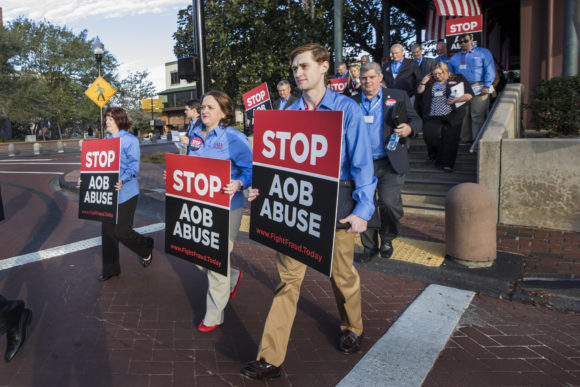Almost five years after Florida lawmakers clamped restrictions on assignment-of-benefits agreements and two years after they effectively outlawed AOBs altogether, state appeals courts may have finally put an end to one creative way that had been used in attempts to get around the law.
Florida insurance industry advocates said some players, though, will likely continue to seek new mechanisms to skirt the laws that took away what was once a highly lucrative business model for a number of contractors and policyholder attorneys.
“I’m sure they’ll still come up with a way to try and get around the statutes,” said Tiffany Roddenberry, an attorney with the Holland & Knight law firm who was involved in two recent AOB appeals. “But at least on this, the appeals courts have come out against it and are in agreement.”
In the most recent decision, Florida’s 5th District Court of Appeals late last week upheld a Marion County judge’s ruling that an organization known as Holding Insurance Companies Accountable (HICA) had no standing to sue Tampa-based American Integrity Insurance Co. The case was one of several HICA had pursued for years against American Integrity and against Security First Insurance, two of the largest insurers in the state.
It all began in 2019, as the insurance litigation crisis in the state worsened. The Florida Legislature that spring approved House Bill 7065, which became the landmark statute 627.7152 and put new limits on AOBs in an attempt to reduce lawsuits.

HICA argued in the appeal that it was not a contractor, only a service that advocated on behalf of homeowners. The AOB law, including its rules requiring an itemized listing of damage to the property, signed agreements, notices of intent to file suit, provisions to allow insureds to rescind the agreements, limits on attorney fees, and other provisions, did not apply, the organization said.
Leonard Caruso, a homeowner in The Villages who had sustained some wind damage to his roof, had filed a claim and hired Noland’s Roofing Inc. to make the repairs. Caruso signed a directive to pay, essentially instructing his insurer, American Integrity, to pay the roofer. He also signed an AOB contract with HICA, which calls itself a business that helps enforce homeowners’ rights under their insurance policies, the appellate court explained.
But the courts held that HICA principals had pledged to give recovery from the lawsuits to Noland’s Roofing, its chosen contractor. That is the same as an AOB, the trial and appellate court judges noted.
 “As the trial court found, this mandatory pass-through of benefits from HICA to Noland’s Roofing places the assignment within the broad reach of section 627.7152,” Judge Harvey Jay wrote in the 5th DCA’s Jan. 3 opinion. “Even though HICA will not personally scale Caruso’s house to repair his roof, it is seeking funds to facilitate those repairs.”
“As the trial court found, this mandatory pass-through of benefits from HICA to Noland’s Roofing places the assignment within the broad reach of section 627.7152,” Judge Harvey Jay wrote in the 5th DCA’s Jan. 3 opinion. “Even though HICA will not personally scale Caruso’s house to repair his roof, it is seeking funds to facilitate those repairs.”
The Florida Legislature in 2019 had mandated that AOBs comply with all provisions of the assignments law. And because the HICA assignment agreement did not do that, it is invalid and unenforceable, the court noted.
The ruling followed similar recent decisions: one by the 5th DCA in December in another HICA suit filed against American Integrity; one in May involving American Integrity; and another in February 2024, by the 2nd DCA, involving Security First. The 2nd District Court also in 2022 ruled against another contractor, Richie Kidwell’s Air Quality Assessors, in yet another American Integrity case. The court found that Air Quality’s agreement with a homeowner was, in fact, an AOB and did not comply with the 2019 law, despite Kidwell’s arguments that it was an assessment of damage, not an assignment of benefits.
Perhaps seeing the futility of pursuing further appeals, HICA in December tried to drop its appeal of the Caruso suit. But the 5th DCA refused to accept the dismissal “because the issue presented is one of importance and for which a published decision would be helpful,” the judges noted, citing the precedent of a 2016 court ruling.
The recent appellate decisions are considered significant victories for insurance companies that have battled AOB suits for years, said William Large, president of the Florida Justice Reform Institute. Large and Roddenberry penned amicus curiae briefs in two of the 2024 appeals, on behalf of the insurance industry.
“This appeal presents an issue of paramount importance to Florida’s property insurance industry: ensuring the application of legislative reforms designed to prevent abuse of assignments of benefits,” reads the amicus brief in the December 5th DCA HICA appeal, decided Dec. 23, 2024.
AOBs may have started as a way to make it easier for storm-stricken homeowners to leave the hurricane restoration and insurance recovery work to others. But by the mid-2010s, several contractors and their attorneys had learned to game the system and take advantage of one-way attorney fees, generating thousands of unnecessary lawsuits against insurers and abusing the legal system, Large and others have argued.
“Studies have confirmed those abuses, and underlined further that AOBs were one of the driving forces of insurance-related litigation in Florida since 2000,” the Justice Reform Institute’s brief noted. The Institute’s own 2019 study, authored by industry consultants and lobbyists Mark Delegal and Ashley Kalifeh, said the number of lawsuits brought by AOB holders had increased by 16,000% in the two decades since 2020.
The recent appeals were expected after the 2019 AOB law was adopted, and it has taken five years for courts to nail down the full reach of the statute, Large noted. This means insurers can now know the extent of the law for actuarial purposes. It’s unlikely the HICA suits will be appealed to the state Supreme Court.
And although Florida lawmakers in 2022 in a special legislative session specifically put an end to assignments of benefits, the multiple lawsuits by Holding Insurance Companies Accountable shows the lengths that some contractors will go to try and get around the statutes, attorneys said.
“It always surprises me the imagination that some of these people have,” Large said.
And in instead of AOBs, some restoration companies continue to pursue similar agreements under the name of “directives to pay.” The 5th DCA addressed that issue only in passing in the Jan. 3 opinion.
“I do not think this decision was so much a commentary on ‘directions to pay’ as it is on what qualifies as an assignment of benefits under FS 627.7152,” said south Florida attorney Michael Packer, of the Marshall Dennehey law firm. “I think the 5th DCA, following the lead of the 2nd DCA, is sending a message that they are not going to look favorably on these attempts to circumvent the requirements” of the 2019 AOB statute.
Photo: In January 2018, more than 125 insurance agents from across Florida, along with members of the Consumer Protection Coalition, marched to the Florida Capitol to highlight the need for AOB reform. (Colin Hackley photo)
Was this article valuable?
Here are more articles you may enjoy.


 Portugal Rolls Out $2.9 Billion Aid as Deadly Flooding Spreads
Portugal Rolls Out $2.9 Billion Aid as Deadly Flooding Spreads  FM Using AI to Elevate Claims to Deliver More Than Just Cost Savings
FM Using AI to Elevate Claims to Deliver More Than Just Cost Savings  Why 2026 Is The Tipping Point for The Evolving Role of AI in Law and Claims
Why 2026 Is The Tipping Point for The Evolving Role of AI in Law and Claims  Credit Suisse Nazi Probe Reveals Fresh SS Ties, Senator Says
Credit Suisse Nazi Probe Reveals Fresh SS Ties, Senator Says 